Mrs Josephine D’Arrigo, College Psychologist, has put together a blog post about Sleep Awareness. The blog post is part of our student well-being blog published twice a term.
Sleep Awareness
By Mrs Josephine D’Arrigo, Psychologist
Sleep is a vital indicator of overall health and wellbeing and impacts significantly on our ability to function during the day. For children and adolescents, inadequate sleep can impact on cognitive and psychological (emotional and behavioural) functioning.
Impact of inadequate Sleep on Children and Adolescents
Inadequate sleep for children and adolescents has been shown to contribute to mental health issues including depression, anxiety and behavioural concerns. It also impacts on learning processes such as language acquisition, working memory, processing speed, and executive functions including the ability to plan, organise and focus attention. All these processes are crucial in being able to function in a school environment. Studies have also shown that a reduction in as little as one hour sleep can impact on cognitive and emotional functioning. Therefore, sleep hygiene is important as students manage their academic and emotional progress.
The impact of Technology on Sleep
One of the main factors that impact on our sleep, particularly for our young people is the use of technology and social media. It has been known that the blue light emitted from phones, TVs and tablets suppress melatonin in the body which is a hormone that supports the wake/sleep cycle known as circadian rhythm. For this reason, it is important to turn off all electronics at least 30 minutes before bedtime and do something relaxing such as reading. Technology also stimulates the brain and can be quite noisy often disrupting sleep. Therefore, it is best to put the phone in a charger that’s out of reach.
Recommendations for improved sleep include:
- Establish a bedtime routine- going to bed and waking up at the same time.
- Turn off your phone, TV and laptop at least 30 minutes before bedtime. If you need to do homework, it’s best to dim the screen to help wind down.
- Avoid caffeinated food or drinks after 3pm
- Exercise during the day, however it is best not to exercise before sleep.
- Have a wind down period to facilitate sleep e.g. having a bath, reading a book.
- Eat well to avoid feeling hungry before bed.
For more information, you can visit www.sleepheathfoundaton.org.au




